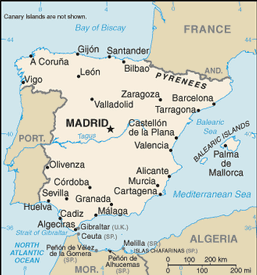Spain
 Spain is a parliamentary monarchy and a member of the EU, OECD, NATO, UN and the IMO. With both Atlantic and Mediterranean coastlines, it is situated in southwestern Europe, to the southwest of France. Its official language is Castilian Spanish; however Catalan, Basque and Galician are also official languages in the relevant autonomous regions. The capital is Madrid. While there is a central government, Spain is divided into Autonomous Regions with certain administrative and legislative powers. Spain has a civil law system, with some autonomous regions having their own particular codes. The King is the Head of State. The Prime Minister is the Head of the Government. There is a bicameral assembly. The monetary unit is the Euro.
Spain is a parliamentary monarchy and a member of the EU, OECD, NATO, UN and the IMO. With both Atlantic and Mediterranean coastlines, it is situated in southwestern Europe, to the southwest of France. Its official language is Castilian Spanish; however Catalan, Basque and Galician are also official languages in the relevant autonomous regions. The capital is Madrid. While there is a central government, Spain is divided into Autonomous Regions with certain administrative and legislative powers. Spain has a civil law system, with some autonomous regions having their own particular codes. The King is the Head of State. The Prime Minister is the Head of the Government. There is a bicameral assembly. The monetary unit is the Euro.
Spain’s major trading partners include the EU member states and the US. The main exports include cars and trucks, manufactured goods, foodstuffs and machinery. Spain has a long maritime tradition, beginning in the great age of European exploration. The Merchant Navy Office, the governing body of Spanish shipping, is responsible for the Maritime Register of Ships and the Mercantile Register (Maritime Section). Spain has also had a second register in the Canary Islands since 1992.
The main legislation applicable to the registration of ships is Decree 1027 of 28th July 1989 on the Flagging and Registration of Ships and the Maritime Register (“Decree 1027/1989”), and Law 27 of 24th November 1992 on State Ports and the Merchant Navy (“Law 27/1992”). Ships have to be entered on two registries of a different nature and scope:
- The Maritime Register of Ships. This register is a public, administrative document, which is maintained in the headquarters of each provincial Merchant Navy Office. There is also a central register, administered by the general directorate of the Merchant Navy Office. They also hold a register of Ship-owning companies, in which all natural or legal persons who own or operate ships must be registered.
- The Mercantile Register. This register is primarily intended to be a register of natural and legal persons. However, according to the transitional provisions of the Rules of the Mercantile Register of 1996, until such time as a register of movable property is established, ships must be entered on this registry in accordance with the relevant provisions of the Mercantile Register Regulations 1956. Inscription in this register has implications regarding the application of the Commercial Code and other legislation. Registration is compulsory and subject to prior registration with the Maritime Register of Ships. It requires production of a certified copy of the ship’s registration with the Maritime Register and of the document of title to the ship, which must be in the form of a public deed or a document produced by a competent authority or functionary.

